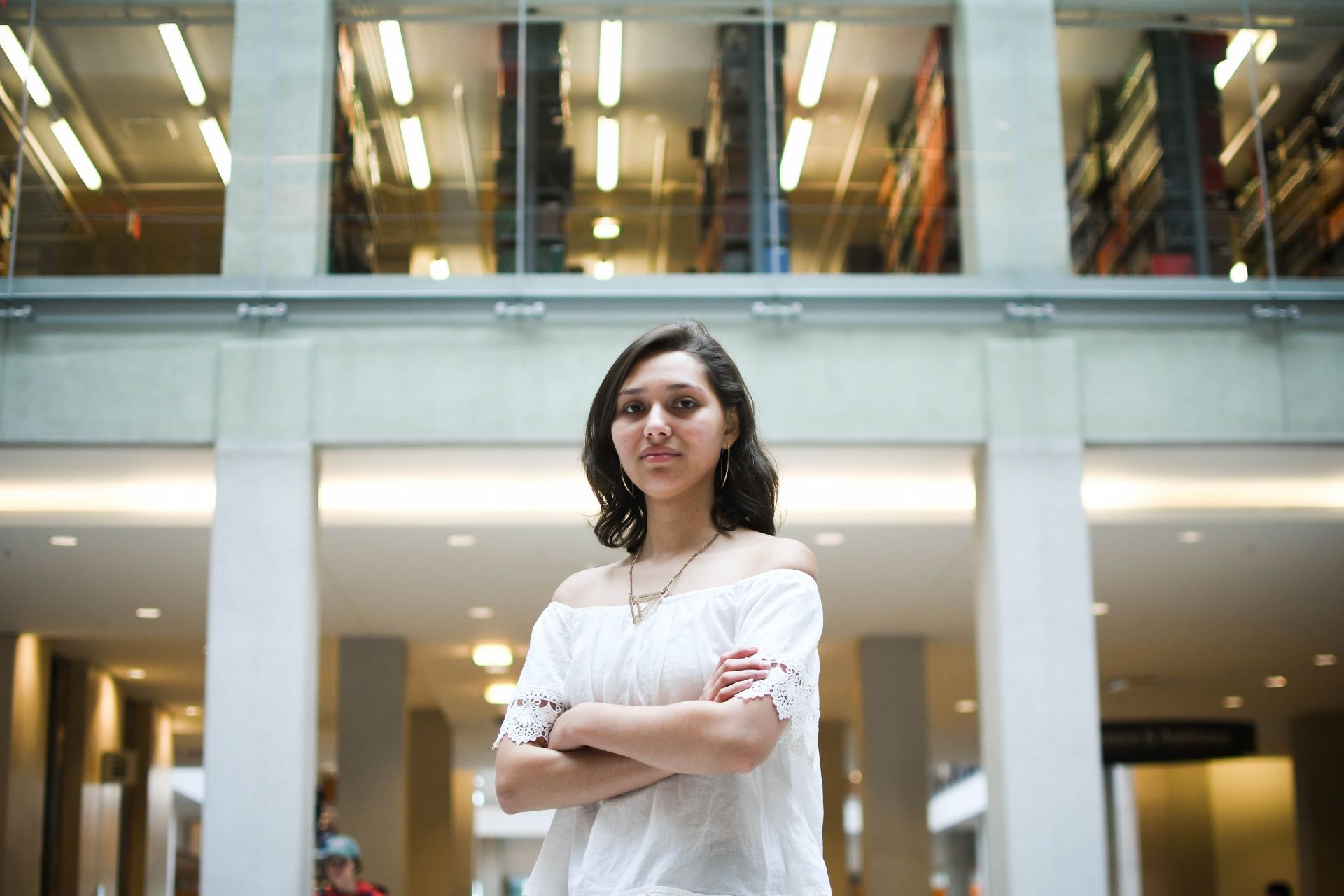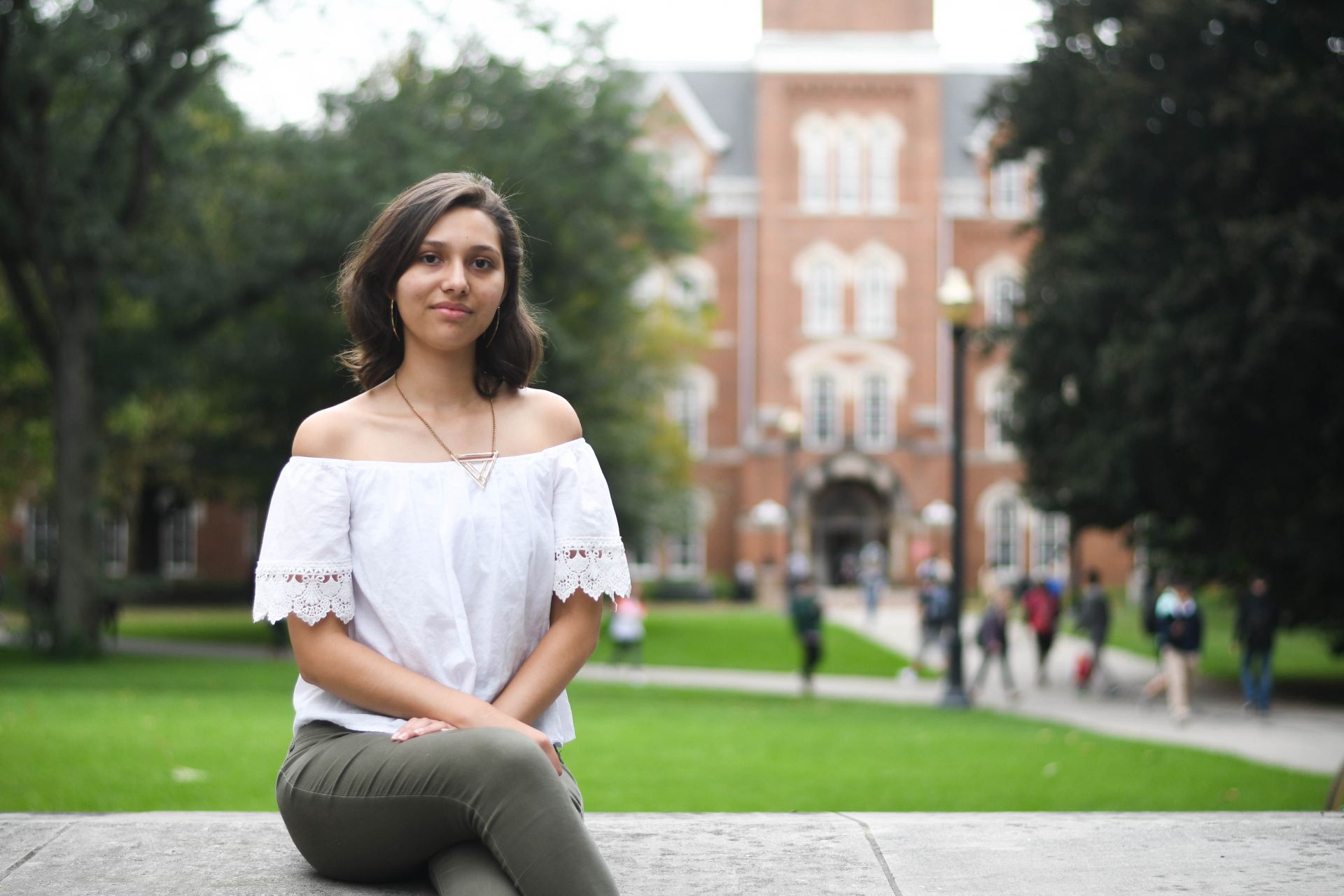
Lidia Garcia, a first-year in women’s, gender and sexuality studies, has benefitted from DACA. Her ability to stay in the U.S. may soon be in jeopardy due to Tuesday’s announcement by Attorney General Jeff Sessions that the Trump administration is rescinding the policy. Credit: Sheridan Hendrix | Oller Reporter
Seventeen years ago, a young lawyer and his pregnant wife decided to leave their home in northern Mexico with their nearly 2-year-old daughter to begin a life in Columbus.
Their second daughter was born a United States citizen three months after the illegal move. Their first, Lidia Garcia, grew up undocumented, remembering about as little of Mexico as her younger sister, without enjoying the benefits of citizenship.
As a teenager, Garcia applied for the Deferred Action for Childhood Arrivals program, which the Obama administration created via executive order in 2012 to provide young people illegally brought to the U.S. as children temporary protection from deportation and the ability to acquire work permits.
“With DACA, I was able to do things that I never would have been able to do,” Garcia said. “I could be somebody, not just somebody invisible, but I could be somebody in life and in society.”
Now a first-year Ohio State student in women’s, gender and sexuality studies, Garcia hopes to become an optometrist.
Those hopes might be dashed, however, because of the Trump administration’s decision to dismantle DACA. Attorney General Jeff Sessions announced Tuesday the Trump administration will rescind DACA, effective March 5, 2018, when recipients will begin losing their status.
To me, even these first few days of college is like a blessing because I never knew anyone who went to college and who was undocumented. Just to attend college, I never knew if it was going to be possible. – Lidia Garcia
DACA’s end follows the threat of legal action by several Republican attorneys general in June. They said if the Trump administration hadn’t terminated the program by Sept. 5, they would add challenge it in court.
“As the Attorney General, it is my duty to ensure that the laws of the United States are enforced and that the Constitutional order is upheld,” Sessions said during his announcement. “To have a lawful system of immigration that serves the national interest, we cannot admit everyone who would like to come here. That is an open border policy and the American people have rightly rejected it.”
Despite the gravity of the situation, Garcia remains hopeful, praying that decisions made in the White House will raise public awareness about situations like hers. With pressure from the public, she hopes to see something positive grow out of the negative.
Garcia said the end of DACA “could be the beginning of something better, maybe even a path to citizenship.”
She said she isn’t necessarily sad to see the program go, “Because the truth is, I’ve lived as an undocumented immigrant the majority of my life.”
Although DACA has given Garcia hope for a future in the United States, it hasn’t made her life easy, especially as an incoming college student.
“When I went to college, I had no financial aid. Nothing. Zero. Everything was out of pocket,” she said.
Although Ohio is one of 20 states to grant DACA beneficiaries in-state tuition, the price of higher education remains steep, especially for someone like Garcia, who lives with a single, working mother. As a result, while applying to college, Garcia said she grew increasingly frustrated with Ohio State’s pledged commitment to “access, affordability and excellence.”

Lidia Garcia, a first- year in women’s, gender and sexuality studies applied for the Deferred Action for Childhood Arrivals program as a teenager. Credit: Sheridan Hendrix | Oller Reporter
That is, until 4 p.m. on Sept. 1, when she received a call from Bowen Marshall, the DACA liaison for the Office of Student Life Multicultural Center. Marshall told her that as a low-income DACA student she would be receiving financial aid from the OSU Scholarship Fund to cover half of her tuition costs.
“I was in shock that a public institution would actually fight for our rights and say that you deserve an education as well,” she said. “It actually makes me happy to go to an institution that says, ‘We care about you.’”
The university does not keep track of how many DACA students attend Ohio State, so Garcia does not know if other DACA students have received similar funding. She was told, however, that whatever happens with DACA nationally, the university will continue working for Ohio State’s DACA students.
For now, Garcia is thankful just to be attending college.
“Education is the first step to becoming somebody in life, to escape the circle of poverty, to escape the circle of being taken advantage of,” she said. “To me, even these first few days of college is like a blessing because I never knew anyone who went to college and who was undocumented. Just to attend college, I never knew if it was going to be possible.”


